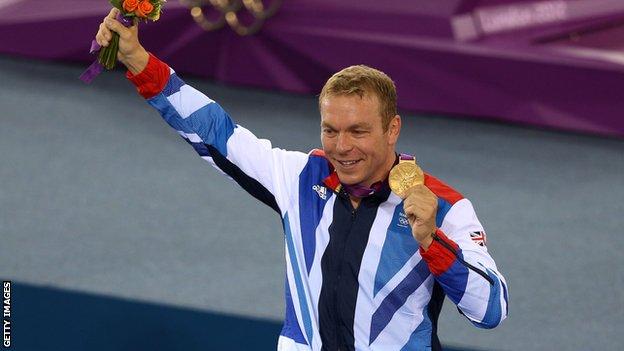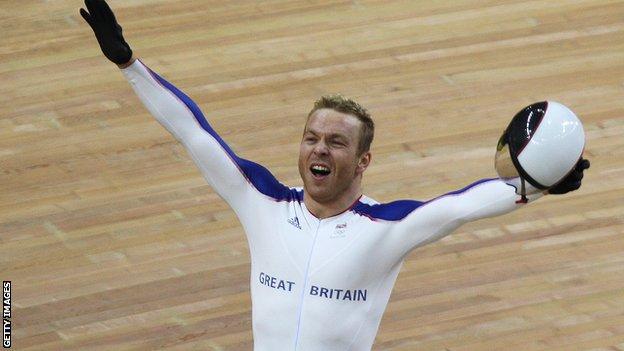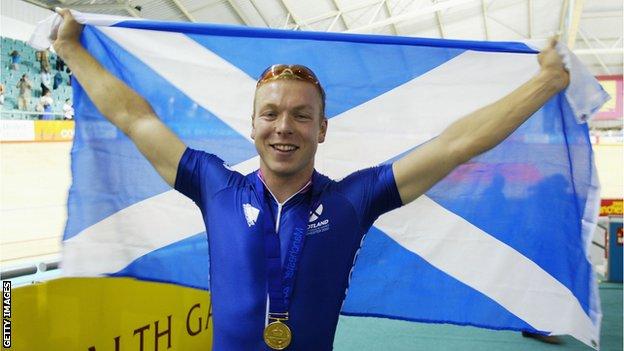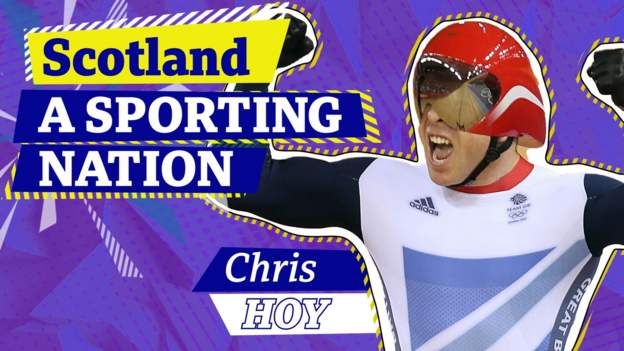Throughout July, BBC Scotland’s Sporting Nation series is reflecting on some of the greatest feats and personalities from Scottish sporting history. Here we look at Chris Hoy, a six-time Olympic cycling champion.

Chris Hoy may not have been with us on the track in Rio when Team GB beat New Zealand to win Olympic gold in the 2016 team sprint, but he still played an important role in our success.
The evening before our Games got under way, Chris came to the athletes village for dinner. Morale at that point was not high. We had finished sixth at the World Championships and one leading bookmaker had us at 22/1 to win gold. At that stage, I think we would have been delighted with bronze.
“You know what boys,” Chris said to us, “you’re going to do it again, you’re going to win and the rest of the world will be left scratching their heads wondering how the hell you’ve done it.”
The cynic in me thought “the sport has moved on a bit mate, it’s a nice sentiment, but I don’t think so.”
His words sparked something in us, though. He lit a flicker of hope in the team. The next day, in the first round of qualifying, we went out and straight off the bat we set a new Olympic record. And from then on we all believed what Chris had told us – we were in it to win it.
From fan, to friend, to team-mate
Chris not only sparked my interest in cycling when I watched him on TV winning Olympic and Commonwealth medals for Great Britain and Scotland, he cemented it. I had a choice to make between cycling and rugby, and it was Chris’ visits to see us at the old Meadowbank Velodrome that convinced me my future lay on the track. He was my hero, but he was accessible.
My journey with Chris has gone from worshipping him from afar, to getting to know him, to becoming his friend and team-mate. The way he comes across in the media, you can tell he is just a genuinely nice guy, but when you get to know him in person – and he probably won’t like me saying this – you find a deeper level to him and it’s actually quite special to be let into that world.
We became a lot closer when I moved down to train alongside him in Manchester in 2008. He was coming off the back of his extraordinary performance at the Beijing Olympics, where he had won three golds.
I remember our coach saying to me at the time: “Don’t waste this opportunity, you’re surrounded by the best athletes in the world.” And Chris takes it to a new level in terms of being a model athlete. Sleep, diet, preparation, training, recovery – everything he does has to be perfect.
On the few occasions I was given the opportunity to chase him in training it felt like a major event, it was really special for me.

He taught me that being an athlete is not just about being successful on the track. It’s about what you can give back to the younger generation, how you can put your influence to the greatest use, what you can do to help towards facilities, funding and all the things that will help make it that little bit easier for the next wave coming through.
Britain’s top young cyclists now come into an elite performance environment, but that was not what Chris found when he was starting out. The advent of lottery funding undoubtedly helped, but it was the performances of the likes of Chris, Jason Queally and Craig MacLean that started the golden streak for British cycling that continues to this day. That may well be his greatest accomplishment.
‘The guy just does not give up’
His greatest race? He may have his own view, but the one that stands out for me is the one that most people would automatically think of – the keirin final of London 2012.
The pressure going into that race was enormous. History was waiting for him if he could get the job done – a sixth Olympic gold that would make him Britain’s most successful Olympian. It was by no means a textbook race from a tactical perspective, but I would rate it as one of the most impressive rides from a physical perspective I have ever seen.
You’ve got the German Maximilian Levy, one of the best riders the sport has ever seen, come onto his hip on the final lap. Knowing the sport and watching that race, I know that is probably the most dangerous position you could possibly be in.
If Levy had managed to get over [pass] Chris it would have been game over, he might not even have picked up a medal of any colour. I can’t tell you how many times I’ve been in that position and lost. But Chris found something within himself to hold off this massive attack at the pivotal moment and power to the line. The guy just does not give up.
The keirin is not a timed event so you can’t point to it being a world record or an Olympic record, but to me that was a record-breaking performance.
When you’re in a hole and things seem to be slipping away at the crucial moment, the marginal gains and all that other stuff we talk about goes out the window. It’s about sheer grit, and only the truly special athletes can find that little bit extra when the stakes are at their absolute highest. It’s illustrative of greatness.

There’s a big attraction in sport towards those who go back and win again and again, whether it’s Tiger Woods, Lewis Hamilton, the New England Patriots in the NFL. Those who have been written off for being too old, told they’re past it, lost their form or struggled with injuries, but always come back and find a way to win. It merits so much respect.
Chris is up there as one of, if not the greatest sportsmen Scotland and Britain has produced.
With us both being Scottish, from the same part of Edinburgh, starting out at the same club, I had to live with the ‘Next Chris Hoy’ tag from a young age. But the truth is there can only ever be one Chris Hoy.
Having replaced him on the team after his retirement, I was just delighted I was able to help continue the British golden streak of Olympic success he started when we claimed that gold in Rio. With a little help from the great man himself, of course.
Callum Skinner was speaking to BBC Scotland’s Andy Burke.
